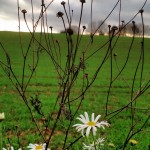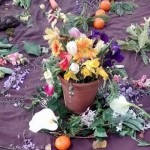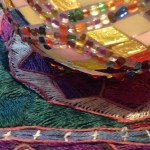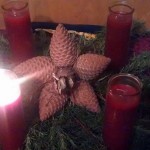“But she’s so Broken. Kaputt! Broken!” That’s what I’m told as I talk about the struggles of a friend. She’s considered one The Broken People. The implication is that the lives of The Broken People are full of suffering. Sad and tragic lives. But we’re not like them. We feel compassion and we shake our heads. They must have made bad choices. They must have refused the healing that could be theirs if they joined us Whole People. Some of them will, but most won’t, so we continue to shake our heads, so kaputt, we say, so unlike us, so in need of salvation. Our hearts ache for them. We love them as Jesus loves us, but often we do so from a safe distance.
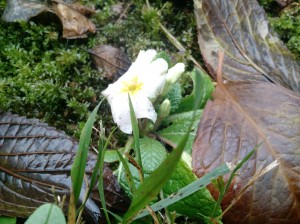
I’m back in Germany, surrounded by old patterns and old memories. It’s causing me to revisit old stories, old interpretations, old ways of looking at the world. I haven’t heard anyone referred to as kaputt in a long time, and up until now I had never given it a second thought. Now I feel the need to untangle the word, the ideas behind it, the worldview I once took for granted.
Growing up I heard the word kaputt applied to people often. Sometimes it went with a sad shake of the head, sometimes with a resigned shrug, and sometimes a sense of derision. I came to see kaputt as a derogatory term for The Others. Those who didn’t grow up in a Whole Christian family as I did, those who were not like us but should be and could be if they believed as we did.
The Broken People were more complicated than we were. You couldn’t predict their actions as easily. They acted out their pain, that’s why therapists were for Broken People. Although what they really needed was Jesus, not human psychology. They could convert, thus leaving their place among the Broken People and join us Saved People. It would make them be less complicated.
Kaputt, kaputt, kaputt. Now I hear the word again, applied to my community and friends. The implication is, I shouldn’t associate with them as much. If that’s my calling and my mission, sure, but then they’re my ministry not my community. It’s OK to reach out to them. It’s not OK to be one of them.
“Ich bin auch kaputt,” I say. I am broken, too. My words meet a wall of silence. “I am! I carry around baggage from years of abuse, and I am Broken but I am healing.” I’m not one of the Whole People anymore. I never really was.
They don’t want to hear that. You’re not broken, I am told. Not in that way. You were raised in a Christian family. If only I came back to Jesus, surrounded myself with Christian people, I wouldn’t have to be with the Broken People anymore. They’re not denying that I’ve been hurt, but they’re saying that I am going about healing the wrong way. If only I made better choices, Christian choices, I could go back to the place of Wholeness in which I was raised.
I let these implications sink in. We’ve had this conversation before, but I’ve never been able to take a step back and reflect. I take a moment to think about who The Broken People really are. They are the ones from whom I learned the concept of privilege. My most important lesson came from Elena Rose who spoke about privilege at a panel discussion (listen to it here! It’s well worth every minute.) Elena lacks a multitude of privileges that American society values. When she introduced herself to the panel, she summarized all of the ways in which she was Other by saying “I am a monster”.*
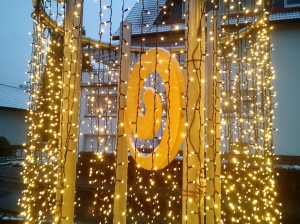
I was appalled when I heard her choose that phrase. She shouldn’t have used that word for herself. I really wished she hadn’t. I was offended. I thought about most conservative and judgmental times, and even back then, I would have never called anyone a monster. Surely?
I’ve since listened to the panel countless times. Eventually I was introduced to Elena in person and came to appreciate her as one of the most beautiful and wise persons I have ever met. More than ever, I couldn’t understand why she would chose to use such an ugly word for herself in order to make a point. But today, when I heard someone say the word kaputt and I saw the look on their face. It’s that look of pity and disgust and compassion and the sincere hope that they too will be saved.
Isn’t this how we’ve always looked at monsters?
Today I’m not trying to get anyone saved anymore. Today I’m with The Broken People. With the monsters, if you will. “Ich bin auch kaputt,” I say again. I, too, am one of The Broken People. The monsters. And I’m OK with that. I don’t need to be saved from who I have become. I am grateful for the life I live now. It’s true that much in me has been broken, but I am healing. Not in spite of The Broken People, but because of them, because of us, together.
I can’t help but notice how different my community today looks from the ones in my past. My community has become much more diverse. The reasons for why we don’t fit into mainstream society are plenty. Ironically, we look a lot like the crowd that surrounded Jesus in his day. Friend of sinners, he was called, friend of Broken People, friend of monsters. Not the Jesus churches taught me to see, but the one I loved when I was a little child.
Another piece has snapped into place for me. This is what I traveled to Germany for. To find my roots, to retrace my journey, to integrate my past. The desire to go back, so strong in the year of my divorce, was always based on an illusion. It has faded over the years, and only rarely ever flickers into existence anymore.
I’m enjoying spending time with my family and childhood friends. We look through old photo albums, retell the stories we all have heard a hundred times or more. This is all a part of who I am. But I’m also starting to feel a little homesick. Homesick for my community of Broken People who sit with me through bouts of depression, who call me out on my dysfunction, but don’t expect me to be whole.
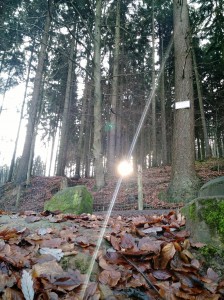
I’m watching the light return and the sun traveling a touch higher above the horizon. Soon it will be time to say goodbye to the home in which I grew up and return to the home in which I am now growing. In a moment I will meet my oldest childhood friend and we’ll peruse more photo albums. But until he shows up, I think back upon our Winter Solstice ritual in which we danced the Spiral. A community of Broken People locking eyes with strangers and loved ones, and singing together, as I am singing now:
Forget your perfect offering
Ring the bells that still can ring
There is a crack in everything
That’s how the light gets in
That’s how the light gets in
* Elena is writing a whole book on this idea and I couldn’t be more excited. It’s still in the works, but you can follow her on Twitter and catch one of her offerings at PantheaCon 2016.

